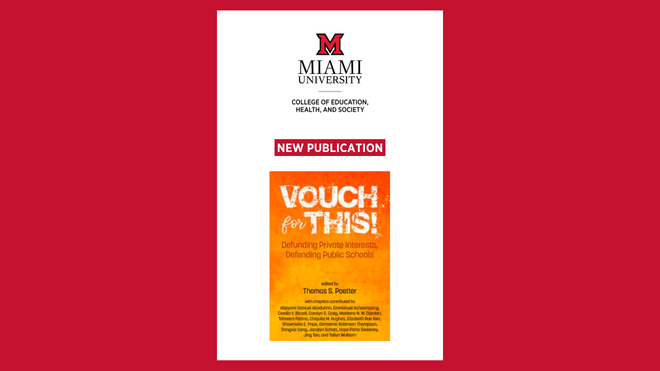Miami University scholars publish thought-provoking book 'Vouch for This!' examining the challenges of education privatization

Miami University scholars publish thought-provoking book 'Vouch for This!' examining the challenges of education privatization
In a collective effort to study the impacts of voucher and charter school movements, 15 doctoral students from Miami University's educational leadership program have authored a book titled "Vouch for This! Defunding Private Interests, Defending Public Schools."
Under the guidance of Thomas Poetter, professor of Educational Leadership, and released by Information Age Publishing, the book delves into the challenges arising from the privatization of public education and its broader implications for society.
Employing a curriculum studies approach incorporating autobiographical analysis and a policy advocacy framework, the students explored various dimensions of current policies and practices related to vouchers and privatization efforts in education. The book encompasses a comprehensive examination of these issues as manifested in charter schools, homeschooling, and private educational settings.
The authors utilize scholarly tools such as currere and policy advocacy to confront the multifaceted challenges posed by the rapid growth of neoliberal, privatizing movements within the public school system. They shed light on the increasing allocation of taxpayer funds to private schools, charters, and homeschooling, illustrating the ongoing decline of public education orchestrated by politicians and private entities in Ohio and beyond.
"Vouch for This!" not only dissects the pitfalls of privatization but also provides insights into resisting these trends. With contributions from education activist William Phillis, the book's foreword discusses the constitutional challenges of voucher movements, as demonstrated in the public case "Vouchers Hurt Ohio," initiated by The Coalition for Equity and Adequacy of School Funding.
Structured with chapters addressing topics such as democratic accountability, the recolonization of communities by charter schools and universal vouchers, financial implications, and impending tragedies, the book invites readers to engage in critical discussions about the future of public education. The authors emphasize the importance of collective action to counter the influence of capital interests and safeguard the democratic principles associated with public schooling.
(AI tools Grammarly and ChatGPT 3.5, a language model developed by OpenAI, assisted in writing this news story.)